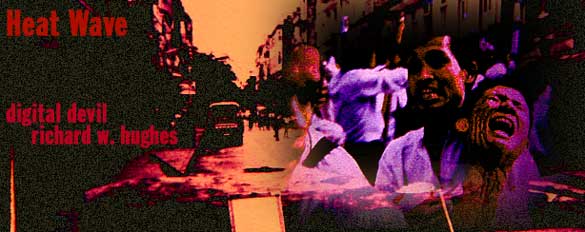Digital Devil #13. A tale of Burmese rubies, Burmese heat, a Shan princess and a Burmese general.
An' I'm learnin' 'ere in London what the ten-year soldier tells:
'If you've 'eard the East a-callin', you won't never 'eed naught else.' Rudyard Kipling, Mandalay
Digital Devil #13 • Heat Wave
Nowadays the heat gets to me. Wasn't always that way. I used to enjoy it – revel in it. But no longer. Can't take the heat anymore. And right now it's hot. Steaming.
Starts deep inside at the kernel, that storehouse of primal code and mad memories. I know when I enter. Perspiration seeps out like the trace from a jungle leech – only a single drop of blood as evidence of the bite. Next I know, I'm in a full-press sweat – red raining out. Forty-three years' old, I still crave warmth – need it like a junkie's fix – but no longer can stand where it takes me. And I'm writing this in a furnace. God, I wish the weather would change…
No! you won't 'eed nothin' else, but them spicy garlic smells…
1976. Eighteen years' old. I made my excuses, waved my bye-byes and blew outta town, ending up in Asia. It was Burma where the heat really hit me. Comin' down outta Nepal to Calcutta was a taste, but only in Rangoon did I feel its full force. Stepping off the plane, I was suffocated. Burma needs no weathermen. It never changes.
Certain countries have a smell, others a sound, yet others a taste. Burma assaults the senses like 25 sticks of dynamite. Banana trees, coconuts, golden pagodas – imperial jade and pigeon's blood rubies. All that and the heat – a heat like no other, a steak-frying open-air sauna that envelops all the moment they crack the airplane door. I liked it at first, was drawn to that sticky warmth, couldn't get enough.
But Burmese blood flows from more than just birds and baubles. Since 1962, the country's been saddled with a military junta that takes its cues from the ultra-right but still can't get the trains to run on time. As one pundit put it: "The only thing that works is the means of repression."

Never forget the last day of my first visit, sitting outside my hotel talking to an old Burmese man. We spoke about the present, even chatted about the future. As I got up to leave, he mumbled something about how things were not always this way. His last words still sting – shattered glass ground deep into my psyche: "I wish the British would come back," he softly said. And looking around to make sure no one else was listening, he whispered: "Even they were never this bad."
An' the sunshine an' the palm-trees an' the tinkly temple bells;
1979. Twenty-two years' old, back for more. Living in Bangkok, but something about the earth's turnin' kept me whirling towards Burma. Heat creates a vacuum. I was sucked straight in. Weekends I'd take the bus up to the border. Mae Sot, Mae Sai, Three Pagodas Pass, it didn't matter – these were my playgrounds – vacation idylls – where I'd pore over more rainbow-colored blood from across the border – jade, spinels, rubies and the other precious little rocks that had just crossed to freedom. Then it was over the river to rebel camps, no immigration stamp needed, no air conditioning possible. Hotter still. Cross that mapline and you stepped straight into the furnace. You could almost feel the earth boil. I couldn't get enough.
But that's all shove be'ind me – long ago an' fur away…
1995. Back in my hometown, Boulder, Colorado. Thirty-six years' old, close to half my life spent in the tropics, but by now I hate that weather. It saps me – makes me weary – takes away my dreams. Late one steaming summer evening, insomnia forces on the tube. An image from my childhood squeezes out of the steam and static. The face is familiar, older than my memories, but familiar nonetheless. It is Inge, the German-language teacher from my junior high school. She is speaking about a book she has just written, somethin' about her past…
An' there ain't no 'busses runnin' from the Bank to Mandalay…
…1953. Inge, an Austrian girl attending the University of Denver meets Sao Kya Seng, a Burmese studying at the Colorado School of Mines. They fall in love, marry, and take a ship back to Burma. It is there where she first learns that her husband is no ordinary Burmese, but a Shan saophalong, the Prince of Hsipaw State. That makes Inge a Shan princess. In the years to come, she and her husband live out a fairytale fantasy, being blessed with two daughters, Mayari and Kennari.
On the road to Mandalay, Where the flyin'-fishes play…
1962. A change in the political weather, ratchet the temperature up another notch. General Ne Win seizes power in a coup d'état. Sao Kya Seng is arrested on the day of the coup. After a year of stonewalling from the military, Inge realizes she will never see him again and flees the country with her two daughters. Burned by the Burmese heat.
An' the dawn comes up like thunder outer China 'crost the Bay!
2000. Forty-three years' old – halfway home in this lifetime. Late last night, memories of Burma boiled up again. A friend just wrote with news of a fresh military commander in the Mogok ruby-mining district. An edict had reportedly been issued: illegal miners are to be shot on sight.
Times like this I feel tapped out – reached the end of words – nothing left to say. Midnight, yet the sun is high. Incoming. Another heat wave comin' on. I reach out to crack a window – something, anything, but the breeze scalds my skin. The furnace door is open, Lucifer's breath is pouring in. Here we go. I keep thinkin', hopin', prayin' that the weather's gonna change. God, I wish the weather'd change…
For the wind is in the palm trees, and the temple bells they say:
'Come you back, you British soldier; come you back to Mandalay!'
• •
2001. A new millennium. Every year, as they have done since they left Burma, Inge's children, Mayari and Kennari, will write a letter to the military authorities in Rangoon, inquiring about what happened to their father. This year, as every year before, there will be no reply.

Postscript. Inge Sargent returned to Colorado, eventually remarrying. She and her second husband, Tad, are active in the overseas Burmese democracy movement. Her book, Twilight Over Burma: My Life as a Shan Princess, was published by the University of Hawaii Press in 1994. In 1999, Inge and Tad founded Burma Lifeline, a non-profit agency dedicated to helping refugees who have fled the military regime, and are either in refugee camps or still hiding in the jungles of Burma. To read more about Inge & Tad Sargent, see the 14 Feb., 2001 article in the Chicago Tribune "A Royal Duty."
…
Author's Afterword. Published in GemKey Magazine (2001, Vol. 3, No. 2, Jan.–Feb., p. 51, 73), this was installment #13 of my Digital Devil column.


